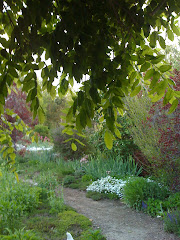One of the most exciting environmental stories in a long time is this one. A dedicated researcher/activist in rural India,
Padmashree Dr. Anil Joshi, using modern and ancient technologies, proved that it is possible to recharge small aquifers and spring catchments. Why is this exciting, you ask? Because water is life. Without it we die. In recharging dormant springs, Dr. Joshi brought life and hope for a better future to one of the poorest regions of India, and just possibly to all of us, as water shortages loom worldwide. Here's the story.
Thousands of years ago, the people who live in India's Himalayas built their villages near natural springs sheltered by dense forests. For eons, annual rains recharged the forest-shrouded springs and the aquifers that fed them. The tree canopy, and the organic offal it sacrificed to the forest floor, preserved moisture and assured the springs continued to bubble year round. The springs nourished the rural agricultural economy of the region, and the villagers were well-fed and content.
Fast forward to the twenty-first century. After almost two hundred years of
British colonial rule (pp.3, pdf file), India leapt into the industrialized world as a sovereign state and began its steady march toward becoming the fourth largest economy in the world (
4th largest in 2009 GDP PPI). India's rapid growth, industrialization and centralization took their toll on the forests and watersheds of the Himalayas. Deforestation laid so much land bare that the spring catchments no longer held enough water to serve the villages year round. Many dried up altogether.
Without water, the people could not survive. Many abandoned their waterless villages. Others struggled with increasing poverty and hunger as their crops no longer supported them. Families were broken: The men moved to urban centers, often thousands of kilometers away, looking for jobs, leaving the women and children behind to work the land alone, dependent on their husbands and fathers to send money to get them through the drought seasons.
Enter Dr. Joshi and his organization
Himalayan Environmental studies & Conservation Organization (HESCO). Himself once a child of the hills. Dr. Joshi believed that science and technology, together with ancient, tested wisdom, were the keys to improving quality of life and to developing the region economically.
Dr. Joshi
recruited a team of scientists to locate a number of spring catchments. When they knew where the springs collected water, they built small dams and embankments called green bunds, which is ancient Hindu technology, to capture moisture and recharge the springs during the rainy season. Villagers built and filled storage tanks to provide a year-round water supply. Now the villages grow and harvest crops for food and for markets outside their area. Farms are prospering once again. Young farmers are staying in the region to till the land and turn a profit.
More, the villages are tweaking another ancient technology, water mills, many of which have been operating for centuries, to provide power from their springs and streams. Generating their own electricity takes them off the less reliable, centralized national grid. With plenty of dependable, locally-generated power streaming to their homes and businesses, in some cases for the first time, the people of the Himalayas can start new businesses and cottage industries with confidence, knowing they will not have to work in the dark, or wait for sporadic energy to power their equipment.
That's not all. Most of India's energy is derived through coal-fired plants. By generating their own power using their recharged streams and springs, rural communities are lowering their carbon output.
Not only is this story exciting for the people whose lives it has changed so dramatically in India, it is exciting for the world as we all face more and more severe water shortages in the decades to come. Dr. Joshi's work shows us that a decentralized water supply, using a mixture of new and time-tested technology, can save and sustain lives, spur local economies, and save the planet.
What's more, this is only one of literally dozens of innovative, life-changing, life-enhancing projects Dr. Joshi has initiated to help rural India raise itself from poverty to an ever-improving quality of life. Learn more about the man and his life work at
HESCO, whose creed could be a model for any of us.
HESCO Philosophy- Serve in the spirit of dedicated volunteerism
- Acknowledge and develop the natural talents of the people you serve
- Give freely of your knowledge and time
- Encourage self-sufficient and "simple" solutions to the practical problems of those you serve
- Promote the practice of "shridan": that every village which is helped with development, will in turn, adopt and help another village in their locality
- Promote sustainable development with a priority on environmental protection and economic independence
HESCO

For choosing to return to his homelands and utilize his training and knowledge to help his people lift themselves from poverty to prosperity, for honoring the wisdom of millenia and melding it with the science and technology of today, for committing to utilizing local materials and resources to solve local problems, for decentralizing energy and water sources while improving their reliability and availability, and for living among and listening to the people he serves, the
Ordinary Heroes Award is offered to Padmashree Dr. Anil Joshi with respect and gratitude.

With gratitude to Tweet
timlawler who introduced me to Dr. Joshi in his 6/28 tweet: "The Mountain Man The Better India: A bright student, he did well through school and college and after completi.. http://bit.ly/196JgG".
All text and images, unless otherwise noted, copyright L. Kathryn Grace, all rights reserved.











